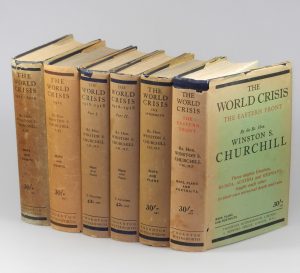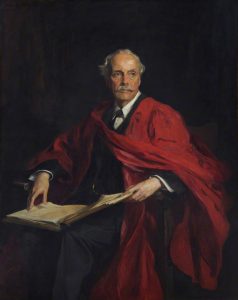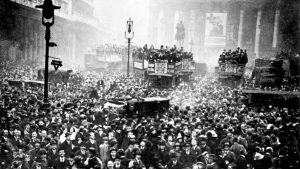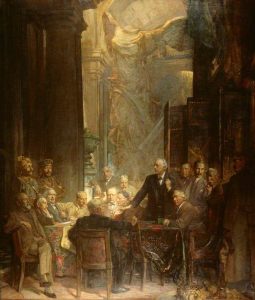Finest Hour 182
Churchill’s World Crisis

The Signing of Peace in the Hall of Mirrors by Sir William Orpen, 1919
March 14, 2019
Finest Hour 182, Fall 2018
Page 26
By Peter Clarke
Peter Clarke is author of Mr. Churchill’s Profession (2012) and former Master of Trinity Hall, Cambridge.
Today, whenever major political leaders come to the end of their careers, we have learned to expect an announcement at no distant point that a contract has been signed for the publication of their memoirs, with large advances mentioned. A hundred years ago, there was no such expectation. Indeed the Armistice can be seen as triggering the inception of a golden century in the modern memoirs industry, signing up authors with the usual motives of political vindication and— not least—financial reward. In this respect, as in many others, Winston Churchill was a pioneer. Moreover, the five volumes that he published under the title The World Crisis (1923–29)—there was later a sixth on the Eastern Front—were not the work of a retired politician. They were begun when he was still in his late forties, written in the midst of an active career. His cabinet colleague Arthur Balfour, a generation older, called it an autobiography disguised as a history of the universe.
That Churchill felt in need of money at this time will come as no surprise to anyone familiar with his incorrigible spending habits. He was a cabinet minister in Lloyd George’s postwar government (1918–22) with a salary of £5000 a year, which would be worth over two hundred thousand pounds today. But this was not enough, in his eyes, to provide for the education of his four children nor to fulfil his ambition to purchase a country house of his own. Politics was indeed his vocation but, as I see it, writing was his profession, in the sense that his highly professional commitment as an author always provided an indispensable source of income.1
Before the First World War, quite apart from publishing volumes of his political speeches, Churchill had himself written half a dozen books that brought in substantial earnings. The most serious of these, in every sense, was his biography of his father Lord Randolph Churchill (1906), for which he got an advance of £8000, say half a million pounds in today’s money. In 1920 he built on his prior reputation as an author, as well as upon his current notoriety as a politician, in asking for more; and he got it. The deal that his agents put together offered advances of no less than £27,000, and although the pound was now worth less than pre-war, this would be at least three-quarters of a million pounds at today’s values.
Big History
Little wonder that, although a busy cabinet minister, Churchill pressed on with his literary commitment. Previously his books had been drafted in his fluent longhand; but the exercise of government responsibility had brought with it a panoply of administrative and clerical support that he learned to use and indeed to rely upon. Henceforth his books were all to be dictated, taken down in shorthand and then typed up by his secretaries in drafts, and even set up in proofs, all of which he would subject to extensive revision. In this sense, the volumes of The World Crisis provide the template for all of Churchill’s subsequent published books, as well as an increasing flow of well-paid articles. “I lived in fact from mouth to hand,” as he liked to say.2 This undoubtedly affected his literary style: not only in tempting him to rely upon extensive quotation from documents but also in licensing sonorous passages that often lacked the spare rigour that had previously disciplined his handwritten composition.

The format of the work was influenced by Churchill’s own ministerial career in another way. In his telling, this international crisis had begun in 1911; but so, of course, had his own direct involvement, with his appointment as First Lord of the Admiralty in Asquith’s Liberal Government, an event that comes at the end of his third chapter. Churchill held this office until May 1915, when, with the failure of the attempt to force the Dardanelles and the consequent bloody stalemate on the Gallipoli peninsula, he was in effect dismissed from the Admiralty. “For thirty-four months of preparation and ten months of war I had borne the prime responsibility and had wielded the main executive power,” he reminds us in The World Crisis.3 Readers have by this point waded through no fewer than thirty-six chapters on the author’s tenure at the Admiralty plus six on the termination of the Gallipoli campaign, thus forty-two in all. This compares with the twenty-three remaining chapters, dealing more briskly with the rest of the World War. The Armistice was the terminus of the original fourth volume; the first two had been published during 1923 and volumes three and four in March 1927.
A Sea Change
The fact that the work seems rather unbalanced as a history of the universe—Balfour’s point, of course—is plainly because its origin was as “my volume of War Memoirs,” which is how he had described the proposal to his literary agent in 1920. But there was a further reorientation. In 1921, when the first two volumes were in preparation, Churchill revealed that he envisaged giving his work the title The Great Amphibian.4 This was indeed a dominant theme in what he was currently writing in defence of the Gallipoli campaign. By the end of 1914, he argued, the land war on the western front, begun by the German invasion of Belgium and France, had settled into a stalemate. “It was our turn now,” wrote Churchill. “The initiative had passed to Britain—the Great Amphibian.”5 In a land war, relative advantage lay with Germany; only by exploiting Britain’s own relative advantage in sea power could the tables be turned. Hence the strategic choice that the author now posed, using the present tense for immediacy: “Shall our armies toil only in the mud of Flanders, or shall we break new ground? Shall our fleets remain contented with the grand and solid results they have won, or shall they ward off future perils by a new inexhaustible audacity?”6
It was Churchill’s American publishers Scribners who vetoed The Great Amphibian as the title of the work, insisting instead upon The World Crisis. But Churchill’s text, of course, remains animated by the idea that, whatever the flaws of the Gallipoli campaign, it offered a means of deploying the leverage of British sea power; and the only alternative grand strategy was the immiserating experience of trench warfare on the western front. Thus Churchill quotes at length his memorandum to Asquith on 29 December 1914: “my impression is that the position of both armies is not likely to undergo any decisive change—although no doubt several hundred thousand men will be spent to satisfy the military mind on that point.” Hence the strategic choice: “Are there not other alternatives than sending our armies to chew barbed wire in Flanders?”7 All of this read well in the 1920s.
ANZAC Attack
But if he could thus appeal to his readers’ hindsight about the futility of the western front, he also had to acknowledge their hindsight about Gallipoli, where the total Allied losses eventually totalled 46,000. Among these, unforgettably, were 8,700 Australians and 2,700 New Zealanders.8 Their joint forces, under the acronym ANZAC, had indeed served with notable heroism, which Churchill readily acknowledged: “Anzac is the greatest word in the history of Australasia.”9 The author had special reason to put this on record. For the publication in 1921 of the first volume of the official Australian war history The Story of Anzac, written by the journalist Charles Bean, had already made a highly significant impact. Bean had served as a war correspondent himself; he had landed at Anzac Cove only hours after the first troops, whose story he now told with the imprimatur of the Australian government. His judgment was damning: “So, through a Churchill’s excess of imagination, a layman’s ignorance of artillery, and the fatal power of a young enthusiasm to convince older and more cautious brains, the tragedy of Gallipoli was born.”10
Churchill knew that he could not ignore this; in fact he quoted this comment at the end of the relevant chapter, professing the hope that the Australian people “will not rest content with so crude, so inaccurate, so incomplete and so prejudiced a judgment, but will study the facts for themselves.”11 Though Bean’s work proved foundational in entrenching the Anzac myth in Australian national consciousness, the political reality was that British public opinion mattered more in Churchill’s effort to lay the ghost of Gallipoli. And The World Crisis indeed met with a generally appreciative recognition of the merits of Churchill as author. The literary power of the work, as displayed in the initial two volumes, is frankly not so well sustained in the later ones. This is partly for the obvious reason that Churchill had been not only out of office but out of Parliament when volumes I and II were published in 1923, with time to prioritise his writing. By contrast, having become Chancellor of the Exchequer in November 1924 in Baldwin’s Conservative government, he was a busy man at the Treasury when volumes III and IV were brought to publication in 1927.
Master Manipulator?
In these years, Churchill was reinventing himself as a Conservative. He had gone into politics as a Conservative MP in 1900, but from 1904 to 1922 he had sat as a Liberal; Baldwin’s invitation to him to go to the Treasury in November 1924 came as a surprise. It was a great boon but also raised an obvious question: how could the public trust a man who had changed party twice? And this sharpened the reputational problem that Churchill already faced, with the cry of Gallipoli functioning as a code word in raising the character issue, rather than just an argument over strategy. One prime example is the publication of a book in 1931 with the title The Tragedy of Winston Churchill. It was by Victor Wallace Germains, a military correspondent who had been a prominent defender of Lord Kitchener (and had published a previous book with the memorable title The Gathering Storm).
Germains was plainly out to discredit Churchill and, in mounting his indictment, an exegesis of The World Crisis took up up two-thirds of his own book. The insidious problem, he claimed, was that The World Crisis was “a brilliantly written and powerfully reasoned work,” with a corresponding capacity to deceive. “It is the work of a man specially trained in sifting and arranging the evidence,” Germains tells us. “Churchill the writer is the specialist successful in his own sphere; Churchill, the military leader, is the amateur who blundered.”12 In its way, then, this is a perverse tribute to the literary effectiveness with which The World Crisis had put Churchill’s case before the reading public.
Armistice or Victory?
A sixth volume of The World Crisis, published in 1931, was to deal with the Eastern Front; but it is the intervening fifth volume, The Aftermath (1929), that has been unduly neglected. In the original four volumes of The World Crisis, the final chapter was simply titled “Victory” and ended with the Armistice of 11 November 1918. This surely masked a sleight of hand. Was this indeed an outright victory for the Allies? Or had Germany, with its armies still undefeated in the field, agreed to an Armistice during which a peace settlement would be negotiated? The detailed terms of the Armistice suggest that this was in fact a defeat for Germany, which had to agree to the effective immobilisation of its armed forces, on land and at sea, giving it no option to continue the war should the negotiations fail. “Parliament was disposed to be suspicious of the Armistice terms when they heard them,” is how The World Crisis put it at the end of its fourth volume. “But when the document was read over-whelming thankfulness filled all hearts. No one could think of any further stipulation.”13 “Armistice” is thus elided with “Victory.” But the great controversy over the terms of the Treaty of Versailles, as imposed on Germany in the summer of 1919, flushed this issue out of hiding.

This is where the fifth volume of The World Crisis, published as The Aftermath (1929), signals a significant shift in interpretation, reflecting a change in public opinion both in Britain and in the United States. The narrow point here concerns a verbal distinction between Victory and Armistice. “Had the Germans, instead of asking for an armistice, sought a peace by negotiation and meanwhile fought on, the interpretation placed upon the Fourteen Points by them and by each of the Allies might have been reduced to an exact and concrete form,” Churchill now suggested. But the rapidity of their collapse meant that “they became utterly prostrate and finally submitted to conditions which left them henceforward helpless.”14 The classic denunciation of the Treaty, of course, had been that published by John Maynard Keynes as The Economic Consequences of the Peace (1919). Ten years later, Churchill now called him “a man of clairvoyant intelligence and no undue patriotic bias” and accepted Keynes’s view of the flawed economic settlement imposed on Germany.15
Since we are commemorating the centenary of the Armistice, it is perhaps fitting to note that its very ambiguity stored up further problems, as Churchill thus came to recognise. As the outcome of a victors’ peace, the Treaty of Versailles could be considered quite lenient to Germany; but considered as the outcome of a freely negotiated settlement, the harshness of the proposed reparations became an enduring German grievance. At the end of the Second World War, Churchill and Roosevelt were to insist on Germany’s unconditional surrender. No second Armistice, then, but a peace settlement in keeping with Churchill’s own motto, “In Victory: Magnanimity.”16 This time, things turned out better for everyone.
Endnotes
1. See Peter Clarke, Mr. Churchill’s Profession (London: Bloomsbury, 2012), esp. pp. 73–79.
2. Winston S. Churchill, The Gathering Storm (London: Cassell, 1948), p. 62.
3. Winston S. Churchill, The World Crisis, 1911–18, 2 vols., continuous pagination (London: Thornton Butterworth, 1938), p. 812. Further page references are to this edition. For a useful academic study of the book see Robin Prior, Churchill’s “World Crisis” as History (London: Croom Helm,1983).
4. See Martin Gilbert, Winston S. Churchill, Volume IV, The Stricken World, 1916–1922 (London: Heineman, 1975), pp. 750–59 for the composition and publication of the work.
5. World Crisis, p. 456.
6. Ibid., p. 457.
7. Ibid., p. 484.
8. Paul Addison, Churchill: The Unexpected Hero (Oxford: Oxford University Press, 2005), p. 80; this is an excellent brief account of the significance of Gallipoli.
9. World Crisis, p. 905.
10. C. E. W. Bean, The Story of Anzac (1921; facsimile edn. (1942) as vol. 1 of the Official History of Australia in the Great War, 8 vols., 1923–33). On Bean’s influence, see also David Reynolds, The Long Shadow: The Great War and the Twentieth-Century (London: Norton, 2013), pp. 372–73.
11. World Crisis, p. 553.
12. Victor Wallace Germains, The Tragedy of Winston Churchill (London: Hurst and Blackett, 1931), p. 47.
13. World Crisis, p. 1399.
14. Winston S. Churchill, The Aftermath (New York: Scribners, 1929), p. 100. I explore further aspects of this book in The Locomotive of War: Money, Empire, Power and Guilt (London: Bloomsbury, 2017), pp. 329–31.
15. The Aftermath, p. 115.
16. These words, of course, form part of the “Moral of the Work,” printed in each of Churchill’s six volumes, The Second World War.
Subscribe
WANT MORE?
Get the Churchill Bulletin delivered to your inbox once a month.






